The police interview Chetan to get an eyewitness account of the kidnapping. In pairs conduct the interview. One of you can play the role of Chetan and tell your partner, who plays the role of the police officer, what happened when the kidnapping occurred.
Advertisements
Advertisements
प्रश्न
You are the grandmother. How did you feel when your granddaughter gave you the novel ‘Kashi Yatre’ ? Write your feelings in your diary.
To make your diary entry interesting, read the following information about what is a diary entry.
A diary entry is a purely personal piece of writing. The writer expresses his/her thoughts and feelings. Reactions to incidents are generally poured out in a diary. Hence expressions that are emotionally charged are used.
For example – When you are happy about something, you could start like this
8th July 20xx, Wednesday 8 pm
Today I am very happy as ………………………..
उत्तर
8th July 20XX, Wednesday 8pm
Today I am very happy as my mission is almost over. About a year ago I set a deadline. I didn’t want to remain dependent and helpless anymore. So I decided to cast off the curse of illiteracy. I decided to leam the Kannada alphabet. No doubt, this task would not have seen the day without the active help of my granddaughter. She acted as my teacher and I worked hard and did an amazing homework under her guidance.
Today, my granddaughter has given me a copy of Triveni’s famous novel Kashi Yatre. Lord, how merciful you are ! Now I can read any novel with confidence on my own. don’t need my granddaughter to read Kashi Yatre anymore for me. I have attained selfrespect and independence. It is true that if you are determined you can overcome all obstacles. And I have learnt another lesson. For learning, there is no age bar.
APPEARS IN
संबंधित प्रश्न
Answer the following question briefly
Could the grandmother succeed in accomplishing her desire to read? How?
Here is a story about Swami and his grandmother. After reading the excerpt, change it into a conversation between Swami and his Grandmother.
After the night meal with his head on his granny’s lap, nestling close to her, Swaminathan felt very snug and safe in the faint atmosphere of cardamom and cloves. ‘Oh, Granny !’ he cried ecstatically. ‘You don’t know what a great fellow Rajam is.’ He told her the story of the first enmity between Rajam and Mani and the subsequent friendship.
‘You know, he has a real police dress,’ said Swaminathan. ‘Is it? What does he want a police dress for?’ asked Granny.
‘His father is the Police Superintendent. He is the master of every policeman here.’ Granny was impressed. She said that it must be a tremendous office indeed. She then recounted the days when her husband, Swaminathan’s grandfather, was a powerful sub-magistrate, in which office he made the police force tremble before him and the fiercest dacoits of the place flee. Swaminathan waited impatiently for her to finish the story. But she went on, rambled, confused, mixed up various incidents that took place at different times. ‘That will do, Granny,’ he said ungraciously. ‘Let me tell you something about Rajam. Do you know how many marks he gets in arithmetic?’
‘He gets all the marks, does he, child?’ asked Granny.
‘No silly. He gets ninety marks out of one hundred.’
‘Good. But you must also try and get marks like him…. You know, Swami, your grandfather used to frighten the examiners with his answers sometimes. When he answered a question, he did it in a tenth of the time that others took to do it. And then, his answers would be so powerful that his teachers would give him two hundred marks sometimes.
‘Oh, enough, Granny ! You go on bothering about old unnecessary stories. Won’t you listen to Rajam?’
‘Yes, dear, yes.’
‘Granny, when Rajam was a small boy, he killed a tiger.’
Swaminathan started the story enthusiastically : Rajam’s father was camping in a forest. He had his son with him. Two tigers came upon them suddenly, one knocking down the father from behind. The other began chasing Rajam, who took shelter behind a bush and shot it dead with his gun.
‘Granny, are you asleep?’ Swaminathan asked at the end of the story.
Now read the dialogue and complete the conversation:
Swarni: You don’t know what a great fellow Raj am is! In the beginning I could not get along with him but now he is my good friend. And you know, he has a real police dress.
Grandmother: Is it? What does he want a police dress for?
Swarni: His father is the Police Superintendent. He is the master of every policeman here.
Grandmother: I think, it must be a tremendous office. Do you know, your grandfather was a powerful submagistrate and the Police Force trembled before him? Even the fiercest dacoits of the place fled.
Swarni: That will do, Granny. It’s so boring. Let me tell you something about Raj am. Do you know how many marks he gets in arithmetic?
Grandmother: He gets all the marks, doesn’t he, child?
Answer the following question:
Who was Jerry Fisher? What did he say to try and convince Bill to change his mind?
Answer the following question.
a) "…But up-and-down brushin'
And pokin' and fussin'
Didn't seem worth the time-I could bite!"
What do these lines convey?
Past Continuous
A young girl was kidnapped from the main street of Srutipur at 3 o’clock yesterday afternoon. Chetan was there at that time.

Read the following excerpts from newspapers on various environmental issues.
Ban the Bag
The Indus Valley Civilisation left beautifullycrafted pottery that speaks volumes of the advances its people made. After 3,000 years, if the ruins we leave behind are excavated, chances are only plastic bags would be dug up. It may sound like an exaggeration, but these bags are not biodegradable. Apart from causing emissions when these are manufactured, noxious fumes are released while these are being burnt or disposed off. So, be kind to Mother Earth the next time you go shopping for groceries, remember to carry a cloth bag with you.

What India Should Do
India has released the National Action Plan on Climate Change. Is it adequate? Is there more that the country can do? Here are some ways how we can make a difference.
(a) SOLAR MISSION
1) To promote the use of solar energy through solar photovoltaic and thermal systems for power generation .
2) To integrate other renewable energy technologies like biomass and wind. 
(b) ENERGY EFFICIENCY
1) To mitigate GHG through sector-specific and cross-cutting technology and fuel switch options.
2) To use more LNG and biomass fuels besides seeking tech transfer. 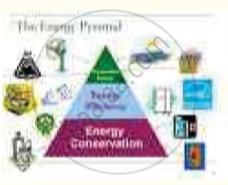
(c) SUSTAINABLE HABITAT
1) To promote energy efficiency in the residential and commercial sectors through LPG use.
2) To manage municipal solid waste and urban public transport in a better way. 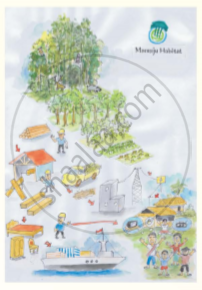
(d) WATER MISSION
1) To promote efficient water use, augment supply in critical areas and ensure effective management of water resources.
2) To have better management of surface and groundwater,and conserve wetlands. 
(e) SUSTAINING HIMALAYAS
1) To enhance monitoring and conservation of the Himalayan ecosystems, empower local communities for management of ecological resources and promote sustainable tourism. 
(f) GREEN INDIA
1) To reduce fragmentation of forests, enhance public and private investments for plantation, upscale joint forestry management and promote conservation of biodiversity. Need to afforest degraded lands.

(g) SUSTAINABLE AGRICULTURE :
1) To focus on four crucial areas - dry land agriculture, risk management, access to information and promoting the use of biotechnology.
2) To develop drought and pest resistant varieties. 
Future Perfect and Future Continuous
Look at the following sentences.

Match words from the different columns to make reasonable predictions. Then write them down in the space below. One has been done as an example.
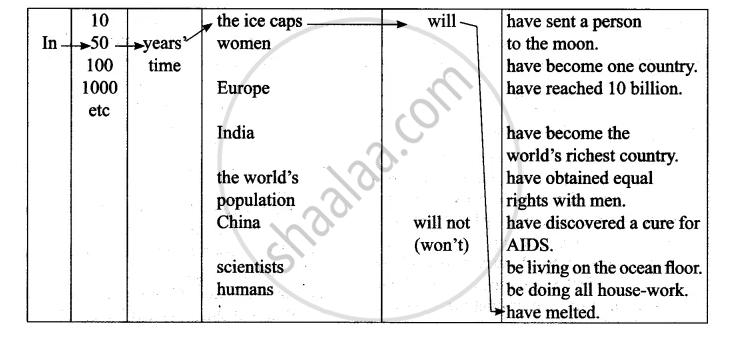
Look at the following pair of sentences. Underline the modals and discuss why each one is used in that sentence.
e.g.
I must not take those pills. (I’m not allowed.)
I need not take those pills. (It is not compulsory but I may if I wish.)
(b) I needn’t go to the meeting if I don’t wish to.
2. (a) I can swim a length of the pool.
(b) I can swim in the pool on Saturdays.
3. (a) You ought to get a nice present for her.
(b) You have to get a nice present for her.
4. (a) Can I go to the toilet?
(b) May I be excused?
5. (a) I may come tomorrow if I have the time.
(b) I might come tomorrow but it’s going to be difficult.
Did you know?
Modals are a small group of verbs that are used to express possibility,
probability, capability, capacity, ability, obligation and predictions.
Some of the modals you learnt in this unit are
can
may
shall
could
might
should
Need, dare, had better are also modals.
Understanding Modals:
Modal Auxiliaries
A modal verb or auxiliary verb is a verb, which modifies another verb, so that
the modified verb has more intention in its expression. In essence the modal
verb expresses modality, the way in which something is being said.
The main modals are
Can: could; may: might; shall: should; will: would: must; ought to; need to;
have to.
The negative modals are
Couldn't; wouldn't; shouldn't; mustn't; needn't; oughtn't/ ought not to
| Modal | Examples | Uses |
| Can/ can't |
She can read and write It can rain today Can I borrow your pen? Can you lend me your notes? Can I carry your books? |
ability possibility /probability seeking permission request offer |
| Could/ couldn't |
Could I borrow your book? Could you please help me with this sum? We could go for a picnic on Sunday I think you could come first this time There was a time when I could work round the clock. |
seeking permission request suggestion possibility/ probability past ability |
| May |
May I have some water? May I help you? May I shut the door? India may become a super power by 2020. May God bless you |
request offer permission possibility/ probability wish/ desire |
| Might | They might sell their house as they need the money. | future possibility/ probability |
| Will /Won't |
It is very cold so I will stay at home. I will help you if you wish. Will you look after my dog for a day? It will rain tonight. I will get you a shawl from Srinagar. |
intention offer request prediction promise |
| Would/Wouldn't |
Would you mind if I come over tonight? Would five o'clock suit you? Yes it would. Would you pass the salt? Would you come to my party? Would you prefer tea or coffee? |
permission making arrangements request invitation preference
|
| Shall |
Shall I help you? Shall we meet at 3.00 pm outside Bakshi Stadium? |
offer making arrangements |
| Should |
We should check the timings of the train. You should listen to the advice of your elders. |
recommended action advice |
| Ought to |
You ought to do your duty. The bus ought to be here any minute |
advice probability |
| Must/mustn't |
We must make a move now. You mustn't tell lies. |
obligation necessity |
| Need |
He need not go to the market. You need to lose weight. I need to get the groceries. |
necessity compulsion insistence |
Study the map and the key given below carefully, and complete the sentences that follow.
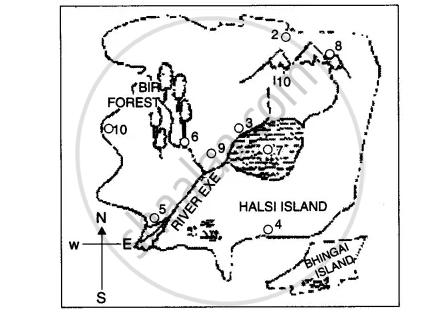
Key
- Lalnagar
- Sarkor
- Timpur
- Rampur (Capital)
- Marwah
- Chickoor
- Strange Lake
- Neverest Hills
- Nafran
- Lakshrnanpur
(a)
|
__________________________ Rampur
|
is is situated lies ____________ is located |
half-way along the west coast of Halsi Island.
on the south coast of the island, north of ___ |
(b) Now describe the position of the other eight places, using some of the words in
the box.
| at | along | among |
| to | next to | opposite |
| on | between | |
| in | above | |
| by | below | |
| over | ||
| under |
Given below is some information about Jesse Owens, one of the most famous athletes of all times. His friend is planning to write his biography. Using information from the table, complete the biography. (The first gap has been completed for you, as an example.)
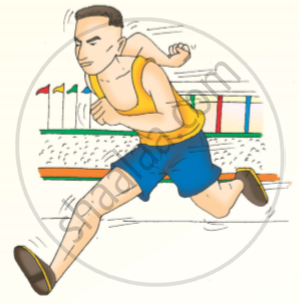
James Cleveland Owens (J.C. Owens) became famous as Jesse Owens
| 1913 | Birth, Alabama, USA. |
| 1934 | After First World War - goes to school, teachers recognise and develop his athletic talents. |
| 1935 | Six world records |
| 1936 | Berlin Olympics, four gold medals |
| 1950 | Sports experts vote him Greatest Track Athlete of the half Century. |
| 1960 | Another athlete breaks Owens' last Olympic record . |
| 1980 | Dies oflung cancer. |
Jesse Owens was born in Alabama USA, in 1913. He was the youngest often children, and the family lived in a cramped shanty house. After the First World War, the family moved to Cleveland, where his school (1)__________ his talents. He quickly became a local hero. Soon afterwards he gained a place not only at the Ohio State University, but also in the US Olympics team.
On 25th May 1935, Jesse Owens performed athletics' greatest feat when he (2) _________ at the Ohio state University Athletics Championships. A year later, at the Berlin Olympics, his greatness was confirmed; he (3) __________ for 100m, 200m, long jump and sprint relay.
Because of his achievements in track and field events, in 1950 he (4) _______ .His last Olympic record (5) ___________ only in 1960. This great athlete (6) ______________ 1980.
